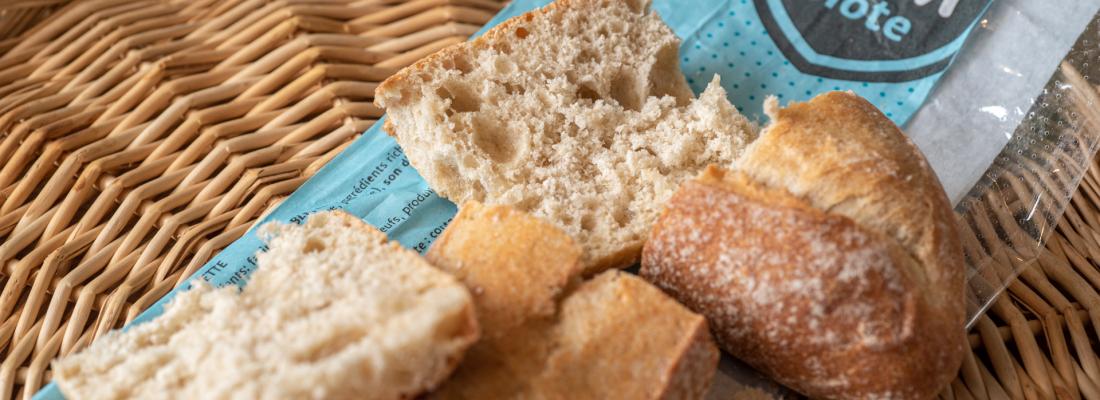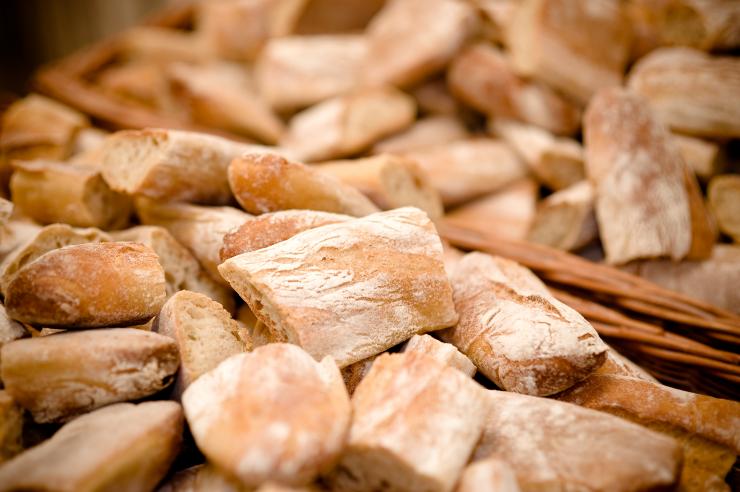Food, Global Health Reading time 4 min
L’Amibiote: a new ally for your microbiota
Published on 28 February 2020

A golden and crunchy crust, a meltingly soft crumb and the smell of bread straight out of the oven… At first glance, l’Amibiote looks like every other baguette you may find on bakery counters. But the crust hides ingredients with numerous nutritional benefits that distinguish this bread from others. The first specific feature is its content in plant fibre. While standard white bread mainly contains starch and cellulose, l’Ambiote is made using seven soluble and insoluble plant fibres (see insert below).
These qualities result from several years of research led by Joël Doré, Research Director at the Joint Research Unit for Food and Gut Microbiology for Human Health (MICALIS) and Scientific Director of the MetaGenoPolis1 Unit at the INRAE Île-de-France–Jouy-en-Josas Research Centre. This “super-baguette”, developed in partnership with Bridor, should thus enable consumers to enrich their fibre intake in terms of both quality and quantity2. L’Amibiote supplies 11 grams of fibre per 100 grams of bread (more than 50% of which is in soluble form), as opposed to 4 grams in a traditional baguette.
L’Amibiote achieves a score of A on the Nutri-Score scale
11 grams fibre per 100 grams bread
This newcomer also has another advantage: patience. It ferments slowly thanks to its yeast content. This controlled development, and its composition, thus give it specific nutritional qualities. L’Amibiote achieves a score of A on the Nutri-Score scale3. And it is not just a question of marketing promises; to confirm its effects on human health, it underwent numerous scientific tests4 which demonstrated that eating 150 grams of this multi-fibre bread contributed to the quality of the gut microbiota (see insert below).
“Consuming a variety of fibres is a reliable means to act on the microbiota and foster the development of different bacteria” explains Joël Doré. At the same time, its nutritional qualities were also highlighted: it lowered cholesterol levels and improved insulin sensitivity. The mechanism underlying these results has not yet been described, but Doré nevertheless points out that the positive action on regulating cholesterol exerted by the beta-glucan in l’Ambiote has been widely documented; he hypothesises that by acting on the microbiota this fibre-enriched bread potentiates this effect. With its crunchy crust and promising results, Joël Doré is extremely proud of l’Ambiote, because “if it becomes widely available to consumers, such a product with proven health benefits could procure a true impact on society!”
1 MetaGenoPolis: unique in Europe, this unit assembles four innovative platforms which serve the medical, scientific and industrial communities for their studies on the microbiota.
2 The French Nutrition and Health Programme recommends consuming 30 grams fibre per day.
3 Nutri-Score: this scoring system for foods is designed to facilitate our understanding of their energy and nutritional values. Using a letter and a colour that range from green/A (the best score) to red/E (the lowest), it can inform consumers about the nutritional quality of food products. .
4 Study conducted in 40 volunteers by the CRNH (Human Nutrition Research Centre, Rhône-Alpes) in partnership with INRAE. The CRNH studied impacts on health and Metagenopolis the effects on the microbiota.

The microbiota, a crucial role in human health
More than 100,000 billion bacteria live in the human gut. Bacteria contain 25 times more genes than the human genome. The gut microbiota lies at the interface between foods and the human body and plays a crucial role in both our digestion and our general health; indeed, it is sometimes referred to as a second brain in the abdomen. Although it is attributed a primarily protective role, any disturbances may also be associated with numerous inflammatory, metabolic or neurological diseases. These bacteria affect inflammation, appetite and even mood. Changes to this complex ecosystem also appear to be linked to chronic diseases, and scientists have established links between a damaged microbiota and obesity, diabetes, allergies or even anxiety, depression and autism. To maintain a satisfactory balance, the microbiota needs to be nourished and cared for.
The intestinal revolution: feed your microbiota
Joël Doré: a specialist in the microbiota
Joël Doré holds a postgraduate degree (DEA) in applied animal physiology. It was during his DEA attachment in 1983 that he started to work at INRAE, since when he has focused on the intestinal microbiota, first in animals and then, for the past 25 years, in humans. In 1992, he applied for his first European project. In 2010 he became Deputy Director of Institut Micalis. Since 2012 he has been Scientific Director of MetaGenoPolis at INRAE’s Île-de-France–Jouy-en-Josas Research Centre, which offers a unique platform for research focused on studying the microbiota using genomic tools.
For more information:
https://www.micalis.eng/
http://www.mgps.eu/index.php?id=accueil
